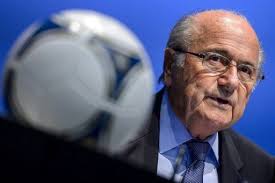By Andrew Warshaw, chief correspondent
July 18 – After months of strong hints and tactical manoeuvring, FIFA president Sepp Blatter has finally come out and supported the growing calls to switch the 2022 Qatar to the winter.
In his boldest statement yet on the issue, Blatter chose a sports business conference in Austria to let it be known that he will push for the tournament to be moved from its traditional summer slot to avoid the searing desert heat that could potentially put the health of players and fans at risk.
Despite FIFA’s technical report team flagging up a number of concerns prior to the December 2010, vote, the Gulf state won a landslide victory, upsetting a furious United States – as well as Australia, Japan and South Korea – in a ballot that was held simultaneously with the 2018 decision (which went to Russia) amid allegations of collusion and foul play that are unproven but still linger.
Blatter is understood to have voted for the United States and while clearly uncomfortable with the majority decision among his executive committee, he has always said publicly that any official request to switch to the winter was a matter for the Qataris who, in turn, have insisted that it was a decision only for FIFA.
Now, the political face-saving has seemingly been broken with Blatter telling a sports business conference that he would be asking his executive committee to sanction a switch despite Qatar’s widely publicised sophisticated cooling techniques.
“You can aircool the stadia but you cannot aircool the entire country,” Blatter told his audience. “We need to protect our partners, our advertisers, our television partners. We have to be very firm. There is still enough time: I will bring this to the executive committee for discussion. The executive committee will certainly follow my proposal. Then we will have dealt with the topic for good.
“The World Cup should be a football festival. Qatar is a small country. But, if the finals should be a true festival then football cannot be played in their summer temperatures.”
The principle opponents of a winter World Cup are the major European leagues who cannot countenance the disruption that a November-December tournament would have, not just for one season but a possible three.
Because of long-term television contracts, a final decision will be needed by 2016 at the latest. Blatter, never shy of promoting the national game over club football, admitted there would be calendar issues but appeared to suggest it was up to the clubs to accommodate any change.
“Shifting the timing of the finals would impact on the fixture schedules in the top European leagues that would probably have to change their annual rhythm for at least one season,” he said.
Speaking via video link, the head of Qatar’s organising committee, Hassan Al-Thawadi, commented: “If it’s a wish of the football community to have the World Cup in winter, then we are open to that.”
UEFA president Michel Platini, who has made no secret of the fact that he voted for Qatar in order to spread the World Cup around, insists he did so on the basis of a winter tournament. There are those who question whether Platini made that clear before he cast his vote but both he and Blatter now agree a summer tournament would simply be unworkable.
Blatter’s recent mid-summer visit to the Middle East is understood to have brought home the dangers. “There has been a fresh medical investigation into what it would be like to play football there in the summer and we have to take into account the health, not of the spectators, but of the players,” he told German television.
“We have to have the courage – that is FIFA’s executive committee – to play this World Cup in the winter and to start to work out now what impact this will have on the international calendar…It would only be for one year, afterwards you’d be back to the normal routine. But I will advocate that.
“We didn’t underestimate this topic. It wasn’t looked at properly. The point is 2022 was a long way away when we decided this in 2010. Now we’re in 2013, three years later, and now it’s time to think about what was maybe not done so well.”
In a statement FIFA confirmed that the issue would be addressed at the next meeting of the executive committee but declined to comment further.
“As mentioned by the FIFA President yesterday, he will bring forward the matter of playing the 2022 FIFA World Cup in Qatar in Winter to the FIFA Executive Committee on the occasion of their next meeting scheduled for 3-4 October 2013,” the statement said. “Please understand that this matter will now be with the Executive Committee and that we can therefore not comment further before the meeting has taken place.”
Meanwhile, Blatter suggested for the first time that Brazil may end up being the wrong choice to host next year’s World Cup if the tournament is marred by the same kind of protests that hit the recent Confederations Cup.
Hundreds of thousands of Brazilians took to the streets with anti-government demonstrations over poor public services linked, rightly or wrongly, to the cost of staging the World Cup.
Blatter revealed just how shaken FIFA was by the mass protests even though it never considered abandoning the two-week tournament. He told the German agency DPA: “If this happens again we have to question whether we made the wrong decision awarding the hosting rights.”
Brazilian President Dilma Rousseff was “now aware that next year the World Cup shouldn’t be disturbed”, added Blatter.
“We didn’t do a political debriefing, but we did emphasise the fact of this social unrest being there for the entire duration of the Confederations Cup. It’s not we who have to learn lessons from the protests in Brazil; politics in Brazil have to do that.”
Contact the writer of this story at moc.l1743778680labto1743778680ofdlr1743778680owedi1743778680sni@w1743778680ahsra1743778680w.wer1743778680dna1743778680
